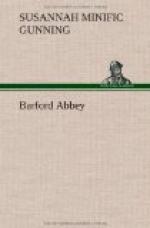F. Warley.
LETTER XXVI.
Lord DARCEY to Sir JAMES POWIS.
London.
Even whilst I write, I see before me the image of my expiring father;—I hear the words that issued from his death-like lips;—my soul feels the weight of his injunctions;—again in my imagination I seal the sacred promise on his livid hand;—and my heart bows before Sir James with all that duty which is indispensable from a child to a parent.
Happiness is within my reach, yet without your sanction I will not, dare not, bid it welcome;—I will not hold out my hand to receive it.—Yes, Sir, I love Miss Warley; I can no longer disguise my sentiments.—On the terrace I should not have disguis’d them, if your warmth had not made me tremble for the consequence.—You remember my arguments then; suffer me now to reurge them.
I allow it would be convenient to have my fortune augmented by alliance; but then it is not absolutely necessary I should make the purchase with my felicity.—A thousand chances may put me in possession of riches;—one event only can put me in possession of content.—Without it, what is a fine equipage?—what a splendid retinue?—what a table spread with variety of dishes?
Judge for me, Sir James; you who know, who love Miss Warley, judge for me.—Is it possible for a man of my turn to see her, to talk with her, to know her thousand virtues, and not wish to be united to them?—It is to your candour I appeal.—Say I am to be happy, say it only in one line, I come immediately to the Abbey, full of reverence, of esteem, of gratitude.
Think, dear Sir James, of Lady Powis;—think of the satisfaction you hourly enjoy with that charming woman; then will you complete the felicity of
DARCEY.
LETTER XXVII.
Sir JAMES POWIS to Lord DARCEY.
Barford Abbey.
I am not much surpris’d at the contents of your Lordship’s letter, it is what Lady Powis and I have long conjectur’d; yet I must tell, you, my Lord, notwithstanding Miss Warley’s great merit, I should have been much better pleas’d to have found myself mistaken.




